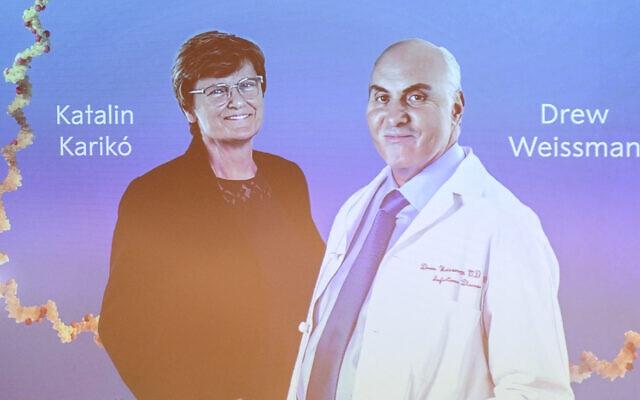A screen at the Karolinska Institute shows this year's laureates Katalin Kariko of Hungary (L) and Drew Weissman of the US during the announcement of the winners of the 2023 Nobel Prize in Physiology or Medicine at the Karolinska Institute in Stockholm on October 2, 2023.(Jonathan Nackstrand/AFP)
US and Hungarian co-researchers cited for contribution to ‘unprecedented rate of vaccine development during one of greatest threats to human health in modern times’
Two scientists won the Nobel Prize in medicine on Monday for discoveries that enabled the development of effective mRNA vaccines against COVID-19.
Katalin Karikó is a professor at Szeged University in Hungary and an adjunct professor at the University of Pennsylvania. Drew Weissman performed his prizewinning research together with Karikó at the University of Pennsylvania.
“Through their groundbreaking findings, which have fundamentally changed our understanding of how mRNA interacts with our immune system, the laureates contributed to the unprecedented rate of vaccine development during one of the greatest threats to human health in modern times,” the panel that awarded the prize said.
Thomas Perlmann, secretary of the Nobel Assembly, announced the prize and said both scientists were “overwhelmed” by news of the prize when he contacted them shortly before the announcement.
Gunilla Karlsson Hedestam, part of the panel that chose the winners, said of their work that “in terms of saving lives, especially in the early phase of the pandemic, it was very important.”
Weissman grew up in Lexington, Massachusetts and received his B.A. and M.A. from Brandeis University. He received his M.D. and Ph.D. at Boston University and later did a residency at Beth Israel Deaconess Medical Center, followed by a fellowship at the National Institutes of Health (NIH), under the supervision of Anthony Fauci, then director of the National Institute of Allergy and Infectious Diseases.
Kariko and Weissman have won a slew of awards for their research, including the prestigious Lasker Award in 2021, often seen as a precursor to the Nobel.
Unlike traditional vaccines which use a weakened virus or a key piece of the virus’ protein, mRNA vaccines provide the genetic molecules that tell cells what proteins to make, which simulates an infection and trains the immune system for when it encounters the real virus.
The idea was first demonstrated in 1990, but it wasn’t until the mid-2000s that Weissman and Kariko developed a technique to control a dangerous inflammatory response seen in animals exposed to these molecules, opening the way to develop safe human vaccines.
Kariko’s and Weissman’s mRNA technology is now being used to develop other treatments for diseases and illnesses such as cancer, influenza and heart failure.
Dr. Paul Hunter, a professor of medicine at Britain’s University of East Anglia, described the mRNA vaccines as a “game changer” in helping to shut down the coronavirus pandemic, crediting the shots with saving millions of lives.
“If it hadn’t been for the mRNA technology, COVID would have been much worse,” he said. “Vaccines generally were the turning point in slowing down COVID and the mRNA vaccines were just so much better than all the others,” he said, noting that the main vaccine used in the UK, made by AstraZeneca, is barely in use anymore.
“We would likely only now be coming out of the depths of COVID without the mRNA vaccines,” Hunter said.
Karikó was a senior vice president at BioNTech, which partnered with Pfizer to make one of the COVID-19 vaccines. The BioNtech website says that since 2022 she has been an external consultant. She is the 13th woman to win the Nobel Prize in medicine.
Dr. Bharat Pankhania, an infectious diseases expert at Exeter University, said that a major advantage of mRNA technology was that vaccines could be made in extremely large quantities since their main components are made in laboratories.
Pankhania predicted that the technology used in the vaccines could be used to refine vaccines for other diseases like Ebola, malaria and dengue, and might also be used to create shots that immunize people against certain types of cancer or auto-immune diseases like lupus.
“It’s possible that we could vaccinate people against abnormal cancer proteins and have the immune system attack it after being given a targeted mRNA shot,” he explained. “It’s a much more targeted technology than has been previously available and could revolutionize how we handle not only outbreaks, but non-communicable diseases.”
The Nobel Prize in physiology or medicine was won last year by Swedish scientist Svante Paabo for discoveries in human evolution that unlocked secrets of Neanderthal DNA which provided key insights into our immune system, including our vulnerability to severe COVID-19.
The award was the second in the family. Paabo’s father, Sune Bergstrom, won the Nobel Prize in medicine in 1982.
Nobel announcements continue with the physics prize on Tuesday, chemistry on Wednesday and literature on Thursday. The Nobel Peace Prize will be announced Friday and the economics award on October 9.
The prizes carry a cash award of 11 million Swedish kronor ($1 million). The money comes from a bequest left by the prize’s creator, Swedish inventor Alfred Nobel, who died in 1896.
The prize money was raised by 1 million kronor this year because of the plunging value of the Swedish currency.
The laureates are invited to receive their awards at ceremonies on December 10, the anniversary of Nobel’s death. The prestigious peace prize is handed out in Oslo, according to his wishes, while the other award ceremony is held in Stockholm.
